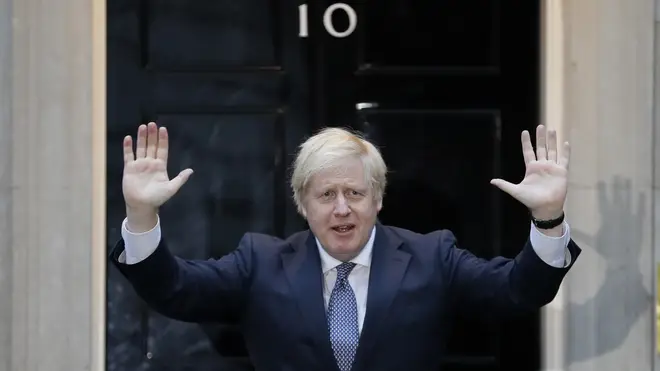
Iain Dale 10am - 1pm
1 May 2020, 06:16 | Updated: 1 May 2020, 07:24

Boris Johnson will set out a "comprehensive plan" on the UK's return to work and normality next week after he declared the country had "passed the peak" of Covid-19.
The Prime Minister yesterday declared the UK has passed the worst stage of the coronavirus outbreak with Downing Street expected to announce what measures will be taken to start leaving the coronavirus lockdown.
The Sun newspaper reported that the PM will announce a three-pronged blueprint which will detail how the economy can be restarted, children will be able to return to school and people can travel to work again safely.
One of the key parts of any strategy is testing with the Government having set itself the target of 100,000 tests per day by the end of yesterday.
The Government's “roadmap of options” is expected to be released on Thursday but, crucially, it will include a timeline on when any will start.
Read more: Prime Minister says the UK is now 'past the peak' of coronavirus
The PM said the outbreak is still too widespread for any easing of lockdown restrictions at the moment, telling the nation “dates and times will very much depend on the data”.
Listen & subscribe: Global Player | Apple Podcasts | Google Podcasts | Spotify
Mr Johnson hinted that the Government could recommend face-coverings, partly to give people the confidence to go back to work. He also denied that he would seek to repair the damage to public finances with another dose of austerity.
Downing Street aides told one newspaper only tweaks “at best” should be expected at the next lockdown review on May 7. Large elements could continue into June and beyond.

Boris Johnson says plan for coming out of lockdown 'to come next week'
The new-father made his commitment as he fronted his first Downing Street press conference since leaving hospital for Covid-19, and he praised the NHS saying he had been "very, very lucky" but "thousands of people have been less fortunate than I was".
With the death toll having exceeded 26,700 and under pressure to detail a blueprint for easing the lockdown, the PM said: "We are past the peak and on the downward slope.
"I will be setting out a comprehensive plan next week to explain how we can get our economy moving, our children back to school and into childcare, and thirdly how we can travel to work and make life in the workplace safer.
"In short, how we can continue to suppress the disease and at the same time restart the economy."
However, the PM cautioned that the timing around relaxing individual restrictions would depend on "where we are in the epidemic" and what the data suggests.

Boris Johnson suggests Brits could be asked to wear facemasks
England's chief scientific adviser Sir Patrick Vallance said the number of people being admitted to hospital across every region in England still needs to be decreased.
But he added: "The number of new cases is down, that's turning into fewer admissions, fewer people in hospital, fewer people in intensive care and we're beginning to see that decrease in deaths."
The PM stressed that the R value - the number of people that one infected person will pass the virus on to - needs to stay under one to avoid Covid-19 taking off again at speed.
Testing and, in particular, contact tracing will be key in suppressing the R value by identifying individuals who may have become infected and ensuring they isolate themselves before spreading the virus any further.
Public health professor Gabriel Scally was highly critical over the Conservative austerity programme for having "emaciated" the system from being able to carry out the extensive testing programme required.
"The resilience has been stripped systematically out of the system, you cannot, when a big problem like this hits, you can't just reinvent things and put them back the way you wish they were," he told BBC Newsnight.
Francis Crick Institute geneticist Sir Paul Nurse was highly-critical of the target, dismissing it as a "bit of a PR stunt" and calling for a more comprehensive programme.
"Testing was absolutely critical, it hasn't been handled properly," he added on Question Time.
The latest daily figures show 81,611 tests on 54,575 people have been carried out, though a time lag in reporting suggests it could be a few days before it is known whether the target was met.
The latest figures from the Department of Health and Social Care show that 26,771 people have now died in all settings with coronavirus, an increase of 674 on the number announced on Wednesday and the third highest death toll in the world behind the US and Italy.
At the press conference, Mr Johnson warned a second spike in cases must be avoided not just because of the death toll it would bring, but because of the potential to inflict even worse "lasting economic damage".
"That's why we have to calibrate our measures so carefully and make sure we not only unlock the economy gradually, but also find ways of continuing to suppress the disease, and possibly find new, more ingenious ways of suppressing the disease," he added.
He signalled that the use of face coverings could be advised as the nation eases itself out of lockdown, saying: "I do think that face coverings will be useful both for epidemiological reasons but also for giving people confidence they can go back to work."